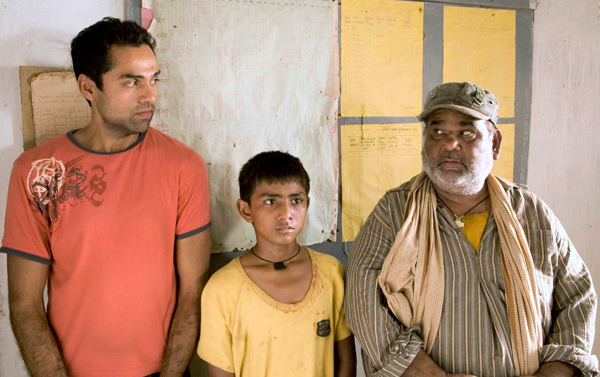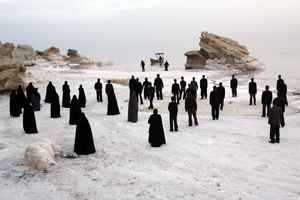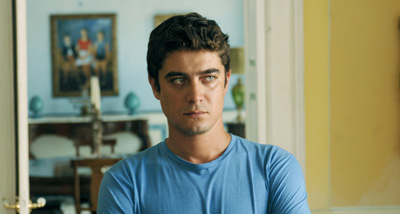|
Reviews of Recent Independent, Foreign, & Documentary Films in Theaters and DVD/Home Video

2010 Tribeca Film
Festival: A Foreign Affair The Tribeca Film Festival has positioned itself as a crucial launching pad for foreign films in the U.S. True, the Toronto Film Festival has an advantage in terms of timing, taking place right before awards season, but Tribeca is the only East Coast event to offer filmgoers the chance to discover gems (and maybe a few clunkers) before any hype or backlash. (I counted 37 world premieres among the feature films). Let the Right One In, which won the 2008 best narrative feature award, may have performed so-so at the box office, but it became a hit internationally. Though last year’s winner, About Elly from Iran, still hasn’t been released here, it was truly deserving of the prize and exceptional. Tribeca won’t approach the exclusivity of the venerable New York Film Festival, with its much smaller slate cherry picked largely from Cannes and Venice, but the TFF has the novelty of the new, and, because of its larger menu, more variety. By the time NYFF commences, many of its selections have gone through the buzz mill. (Who didn’t know in advance about the genital mutilation in last year’s Antichrist?) Why Tribeca has been often slapped with the “populist” label is a mystery to me. What film festival wouldn’t want to open with the attention-getting Shrek Forever After? Wedged into the schedule are genre fare popular in a multiplex in Saigon or Seoul: the Vietnamese martial arts box office hit Clash (starring one hot couple) and the South Korean horror panache The Possessed (I jumped three times in the first hour, none in the last half hour), as well as other commercial fare, like the by-the-numbers French romcom Heartbreaker. However, the programmers have mixed in plenty of serious (whatever that means to you) fare that most festivals would envy.
The White Meadows opens with the graying, nomadic Rahmat rowing out to an island with a landscape so sun-bleached that it blends in with the horizon. He arrives to collect the body of a beautiful young woman preserved in salt. We don’t know how she died. It could have been from natural causes or, most likely as we later learn, she could have been stoned to death for no other reason than that she makes men’s bodies tingle. Rahmat, a collector of tears by profession, holds a delicate glass pitcher up to a mourner’s tear ducts during the community’s demonstration of grief. What the film is really about is Iran, and possibly a parable for collective and corrosive group think, and fascinating in its inscrutability and its blatant metaphors, most apparent in a brutal episode when a painter refuses, to his fellow villagers’ dismay, to agree that the color of the sea is blue. (Don’t ask what his punishment is.) Director Mohammad Rasoulof was arrested March 1, along with his editor, Jafar Panahi, the director of Offside and Crimson Gold. The authorities haven’t even offered a reason. Not coincidentally, both men had supported the opposition against President Mahmoud Ahmadinejad in last year’s election. Rasoulof was released in mid-March, but as of now Panahi is still imprisoned. I won’t be surprised if this wins the best narrative feature award.
If there’s any justice, Sibel Kekilli, who also starred in Fatih Akin’s Head-On, will win the festival’s best actress award. Umay may be beyond naïve in believing that one day her family will accept her as a single mother, freed from any obligations from her husband, but the director smartly directs her to be determined and hopeful. This contradiction charges an already tense film. It’s a confidant and bold debut by Austrian-born Fao Aladag.
In another impressive debut, Carmel Winters’ Snap (as in photo) is the heaviest contemporary film from Ireland that I’ve seen that has nothing to do with alcoholism (at least not directly) or the Troubles or England. Like a mystery, the script doles out clues to what could have caused a vacant-looking 15-year-old boy to hold a toddler hostage for days on end in an isolated house. The film turns darker and darker, with one uncommonly detached and seething sex scene. Without a ghost in sight, the psychological drama’s the scariest movie on the schedule. As the teenager in question, Stephen Moran gives an extraordinary performance, completely internalizing a monster of a role. And the film features the world’s happiest and most adorable baby (really), a relief to the ongoing mother-and-son horror show. Another actor to watch is Timmy Creed in My Brothers, a well-written Irish drama and the second road movie in this write-up, though this one has flat tires and flatulence. He plays 17-year-old Nolan, who steals a delivery van to drive across the country to replace his dying father’s smashed watch. Creed has a quietly appealing and honest presence, just what this film needs, while the director allows two child actors to run rampant. They play Nolan’s younger, bouncing-off-the-walls brothers. They test your patience as only a seven- and 11-year-old can, but Creed’s maturely sensitive performance keeps the film grounded in screenwriter Paul Fraser’s strong debut. And in another smart programming move, Tribeca has the latest film by Brillante Mendoza, who won the best director at Cannes last year for the hyper-violent Kinatay. In many ways, Lola (a term of endearment/respect for “grandmother”) epitomizes current world cinema: filmed on-location in the slums of Manila, with the ubiquitous, shaky hand-held camera and a non-professional cast. It really is about the place, though it focuses on an elderly matriarch whose grandson was killed in a cell phone robbery, and her counterpart, another grandmother fighting to free her grandson, the killer, out of jail. It’s moving, but only rarely do moments yank the film out of the inevitable.
Besides Road, Movie, the new on-demand service presents six other films that are available while they’re playing at the festival. From Sweden, Metropia doesn’t look like any other animated film. Its characters are practically three-dimensional, incredibly lifelike against a colorless, decrepit future in 2024, where, after an apocalypse, all of the subways of Europe are interconnected. (Stockholm to Paris in no time? Who needs planes, volcano ash or not?) The story takes a little bit from 1984’s brainwashed, listless populace and a little from the industrialized landscape of Fritz Lang’s Metropolis. Vincent Gallo, as a pencil pusher turned reluctant outlaw, and Juliette Lewis, as a robotic supermodel (delivering the flattest possible line readings), lend their voices. The Canadian comedy, The Trotsky, also on VOD, offers hope that it will be smarter than your average teen romp. A walking history book, the nebbishy Leon (the very mannered Jay Baruchel from Tropic Thunder) adamantly believes he’s the reincarnation of Leon Trotsky. Only 17, he has already led a strike in his father’s factory (aided by spirit-raising cheerleaders), and now he wants to unionize the blasé student body in his Montreal high school, but the film succumbs to who can shout the loudest with the most F bombs. More laugh
out loud is the sitcomish The Infidel, a sort of Muslim
take on The Birdcage with plenty of British bile. Comedian Omid
Djalili plays East Londoner Mahmud, “a middle-age Muslim misogynist,” as
his grown son describes him, who discovers that he was in fact born
Jewish, before his adoption by a Pakistani family. While he’s getting in
touch with his Jewish roots—sipping matzo ball soup, reading Philip
Roth, and learning the right intonation for “Oh vey”—his son’s about to
marry into the family of a fanatical Muslim cleric. Mahmud and his
family need to jump through hoops to prove they’re proper Muslims for
the cleric to give his consent. Some of the punch lines land better than
others, and the script keeps them coming, though the energy flags in the
last 20 minutes. Simply shot, it will play well on your television screen. Kent Turner
|




